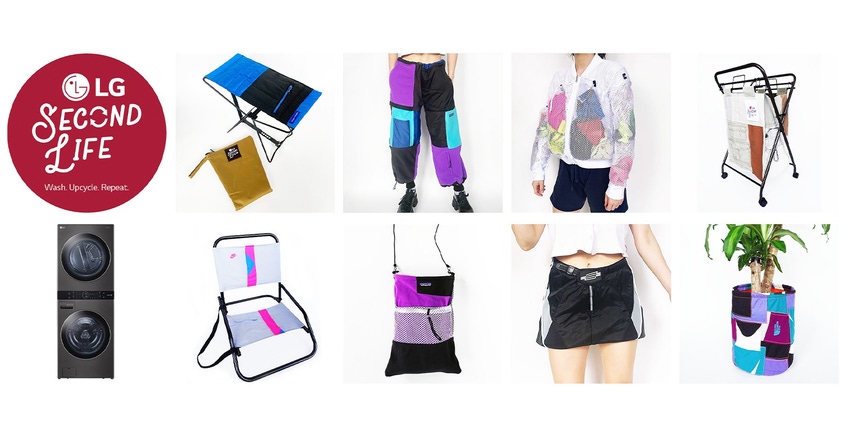Designer Nicole McLaughlin Talks Textile Waste, LG Partnership

When someone asks Nicole McLaughlin what she does for a living, she simply answers, "waste."
For those familiar with waste, recycling and sustainability, that term encompasses so much more than trash. In 2018, the New York-based fashion designer turned her hobby into a career focused on what she describes as an ever-evolving exploration around upcycling and sustainable fashion.
"In actuality, it's not waste. It has/had the potential to be upcycled and given a new life," she explains. "And textile waste is one of the biggest problems in the world. Even if I'm only making one piece at a time using these donated pieces, I'm doing my part to keep it out of landfills."
McLaughlin has morphed old volleyball into slippers and transformed packets of Haribo gummies into board shorts. Her penchant for creative designing is closely aligned with her message of sustainability, something she says is a key element to her success in changing the perception around waste and sustainable design.
She hopes to take her message to the next level in a partnership with LG Electronics. The home appliance manufacturer and McLaughlin announced the collaboration in September, which includes a limited edition capsule collection featuring one-of-a-kind apparel, accessories and home goods made entirely from unwanted clothing collected as part of LG's Second Life campaign.
"I think people forget that fabric care is essential when extending the longevity of their clothes," McLaughlin explained. "Although I never imagined working with a home appliance manufacturer, it made sense."
Some pieces include functional, laundry-centric home décor, including a hamper made from repurposed button-up shirts and cargo shorts; a plant holder using color-blocked pieces of old anorak jackets; a camp chair made from scraps of vintage track suits; and a foldable stool and carrying pouch that she crafted with puffer jackets.
The Second Life capsule is described as a "synergy" between the two in a partnership meant to generate awareness around clothing waste and to inspire people to take action and responsibility through fabric care, donations, and upcycling, Mclaughlin said.
"Millions of people are oblivious to what's happening because of fast fashion right now and the amount of clothing polluting our oceans and landfills," she explained. "We need to start buying less, but that also means buying well and taking care of what we have. Doing laundry well means understanding clothing care, which really maximizes the things you own, and upcycling existing materials to create something new is the simplest way to keep things out of the trash."
McLaughlin added that trying to break or change consumer habits is one of the hardest parts about educating consumers about textile waste. She pointed to the facts, that while 95 percent of textile waste can be recycled, the United States still produces more than 17 million tons of textile waste on an annual basis.
"The fact that we don't see it doesn't mean it doesn't exist," she said. "It's not great, but we're trying our best to educate people out there so they can make the right decisions."
Her staunch dedication and passion for moving the needle on the textile waste crisis has had a wrinkle effect on her own personal habits as well. She noted that sustainability has changed the way she consumes and her work with upcycling has changed her views on permanence. In order to reduce the 292.4 million tons of municipal solid waste the United States produces each year, Americans need to find ways to reuse what is already available.
'I constantly constructed and deconstructed my pieces to try and find the possibilities and imbued them with fun and functionality, so people seeing them for the first time can digest that what they're seeing isn't art; it's upcycling. And if I can do it, so can they," McLaughlin said.
About the Author(s)
You May Also Like




